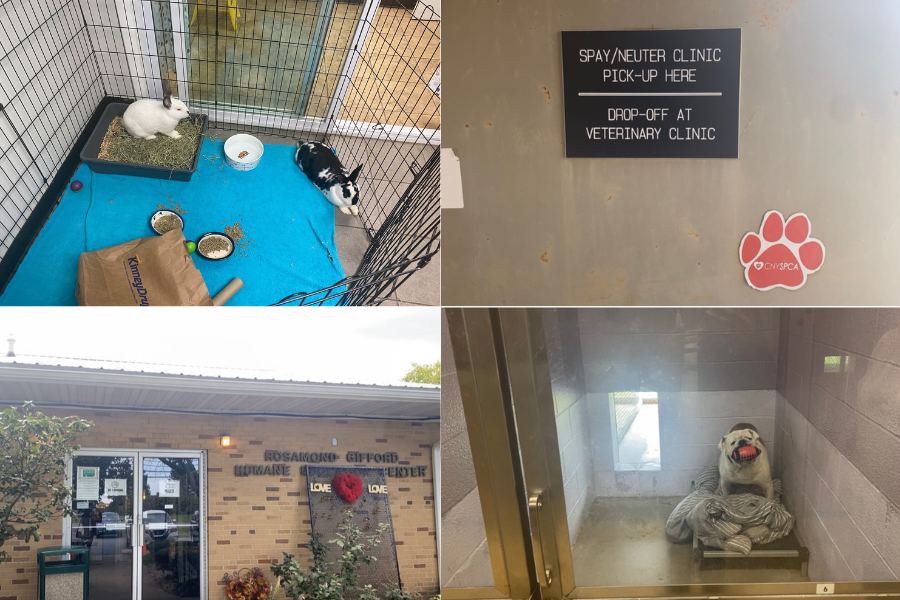Household changes during COVID-19 mean former pets bear the brunt
Household changes during COVID-19 mean former pets bear the brunt

Once volunteers near the blue walls of the animal shelter’s kennels, they are greeted by echoes of several dozen barks. Many of the dogs inside — stray or abandoned — have faced months without human interaction beyond these walls.
The Central New York Society for Prevention and Cruelty to Animals, CNY SPCA, houses 200 animals, a sharp reduction compared to a year ago. Like with many animal adoption centers throughout CNY, staff are seeing an influx of pets being surrendered — and pet organizations are witnessing less visitorship requests.
CNY SPCA humane educator Dee Schafer is one of those witnesses.
“During the beginning of the pandemic, we were adopting out animals left and right. As hard as we tried, we couldn’t keep animals in the building. What we’re finding now is that things are opening up, people are turning those animals in,” said Schafer.
CNY SPCA handles cases of animal cruelty for 16 towns in Onondaga County, all of Madison County and all of Oneida County. It primarily investigates and prosecutes animal abuse and neglect but also educates the public, including schools along with civic and religious groups, about being a responsible guardian of companion animals.
The organization makes sure all stray animals are sterilized — dogs, cats, rabbits, guinea pigs, and degu — and waits 10 days before putting them up for adoption, in hopes that their owners will return to claim them.
Founded in 1966, Humane CNY, a no-kill animal shelter in Liverpool, also advocates for homeless animals. Maureen Davison has been shelter director for a year but has noticed drastic changes in pet returns just recently.
“We have seen an increase in owner surrenders over the last two months. We get at least 20 calls per week from people wanting to surrender pets,” said Davison.
Studies show that human-animal interactions can reduce stress and bring pet owners happiness, according to the Center for Disease Control and Prevention. And health benefits such as decreased cholesterol levels and blood pressure are associated with walking or playing with a pet. Even in NY, a state with the lowest rates of pet ownership, pet adoptions and sales skyrocketed at the beginning of the pandemic, as pets provided people comfort and exercise.
Providing comfort through human-animal interactions is Pet Partners of CNY’s main mission. The Oswego-based organization’s 60 therapy dog teams visit residents at local facilities like St. Joseph’s Hospital, the Francis House, and the Barnes Center at the Arch.
Last year, they began doing virtual visits as well. Pet Partners member Brent Truitt and his dog, Ella, was one of the volunteer teams who conducted remote visits. Truitt and Ella, an adopted shelter dog, often visit a local nursing home in Margaretville and the Anderson Center for Autism in Saugerties. In May, Ella reached 300 visits at the nursing home and has participated in over 1,000 total visits since she became a therapy dog nearly four years ago.
Like all therapy dogs, Ella undergoes basic training — responding to Truitt with head nods, paw gestures, and a trick where she seemingly tells him a secret. Truitt cups his ear close to Ella who is rewarded with a dog treat after she licks his cupped hands.
“I knew that animals could change people’s lives. But I had no idea how powerful that connection was until I see these people turn around,” Truitt said. “They’re in the worst moods and then we leave them smiling. It’s a pretty powerful thing to see in a person.”
Truitt explained that there had been many visiting changes due to COVID-19 restrictions, most recently at the nursing home — where they began conducting virtual visits a week ago — and at the Center for Autism, where visits are held outdoors. Ella is the only visitor that some residents can have because their relatives and friends aren’t allowed inside to visit.
Pet Assisted Wellness Services, or PAWS of CNY, holds therapy dog visits across Onondaga, Oswego, Cortland, Madison, and Cayuga Counties weekly. The restrictions for visits through the nonprofit, however, have ramped up as with Pet Partners of CNY. During last November’s shutdown, the organization lost about half their volunteers.
The organization saw the deaths of nearly 20 therapy dogs due to cancer and old age, according to Rebekah Colling, director of digital marketing and communications at PAWS of CNY.
“They’re hopeful for the future that when they get another dog, they’ll be able to participate again but as of right now we had to completely stop everything and you have to pretty much start from scratch,” said Colling, who has two dogs and two cats of her own. “During the pandemic, the only thing we could really do was keep up with our volunteers on social media.





